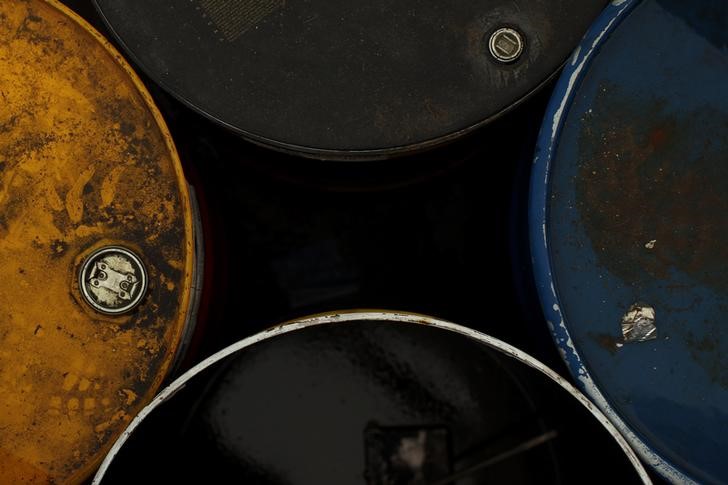Asia tech stocks slide tracking Wall St losses amid AI doubts, govt. uncertainty
* Oil prices fall despite emergency U.S. Fed rate cut
* Oversupply of 800 mln to 1.3 bln barrels possible -IHS
Markit
* China Jan-Feb industrial output shrinks 13.5%
* Brent's premium to WTI close to narrowest since 2016
* OPEC+ calls off technical talks, mediation attempts fail
(New throughout, updates prices, market activity and comments)
By Stephanie Kelly
NEW YORK, March 16 (Reuters) - Oil prices fell below $30 a
barrel on Monday after the worldwide coronavirus outbreak
worsened over the weekend, exacerbating fears that government
lockdowns to contain the spread of the disease would spark a
global recession.
Saudi Aramco (SE:2222) reiterated plans to boost output to record
levels to boost its share of the global market. Top global oil
producers Saudi Arabia and Russia started a price war after
failing to agree on a plan to curb supply as the global economic
slowdown destroys oil demand.
The coming flood of supply from Saudi Arabia and other
producers could result in the largest surplus of crude in
history, said global information provider IHS Markit.
Brent crude LCOc1 settled down $3.80, or 11.2%, at $30.05
a barrel. The international benchmark fell as low as $29.52 a
barrel, its lowest since January 2016.
U.S. West Texas Intermediate (WTI) crude CLc1 fell $3.03,
or 9.6%, to end at $28.70 a barrel, its lowest since February
2016.
Saudi Aramco is likely to sustain higher oil output in May,
Chief Executive Amin Nasser said, signaling the top
oil-producing company is prepared to live with low prices for a
while. The coronavirus outbreak, which has infected at least
174,000 people and killed around 6,700, already has caused oil
prices to plummet by 50% this year. Many forecasters have
lowered estimates on crude demand, as the virus disrupts
business activity, travel and daily life.
With Saudi Arabia and Russia pledging to boost production,
IHS Markit estimates that oversupply of oil could come to 800
million to 1.3 billion barrels -- double or triple what existed
in late 2015 to early 2016, when the Organization of the
Petroleum Exporting Countries pumped more oil to combat the
growing U.S. shale industry.
“The last time that there was a global surplus of this
magnitude was never. Prior to this, the largest six-month global
surplus this century was 360 million barrels. What is coming
will be twice that or more,” said Jim Burkhard, vice president
and head of oil markets at IHS Markit.
An OPEC and non-OPEC technical meeting planned for Wednesday
in Vienna has been called off as attempts to mediate between
Saudi Arabia and Russia made no progress, sources said.
BANK ACTION
Central banks globally took action over the weekend to try
to quell economic fallout of the pandemic, but the measures did
little to strengthen stock markets in freefall, as investors
anticipate a sharp contraction in demand in coming weeks anyway.
The U.S. Federal Reserve on Sunday slashed its key rate to
near zero, triggering an unscheduled rate cut by the Reserve
Bank of New Zealand to a record low as markets in Asia opened
for trading this week.
The Bank of Japan later stepped in by easing monetary policy
further, while Gulf central banks also cut interest rates.
In China, where the virus began, daily refinery throughputs
dropped 4.8% in the first two months of the year, sliding to the
lowest level since December 2018, data from the National Bureau
of Statistics showed on Monday. Brent's premium to WTI CL-LCO1=R narrowed to less than $1
during Monday's session, falling to its lowest since 2016,
making U.S. crude oil uncompetitive in international markets.
Numerous U.S. oil companies have swiftly cut spending, with
analysts anticipating consolidation or restructurings. U.S.
crude output has grown in recent years to nearly 13 million bpd,
making it the world's largest producer.
"Some of them (U.S. shale oil companies) may not survive
prolonged low oil prices, and in this event U.S. production
would decrease. Less crude availability in the U.S. is likely to
reduce the WTI discount to Brent," Societe Generale analysts in
a note to clients.
U.S. President Donald Trump said on Friday Washington would
take advantage of low oil prices and fill the U.S. emergency
crude oil reserve. The move is aimed to help energy producers
struggling from the price plunge.
The United States could begin purchasing domestically
produced crude oil for the Strategic Petroleum Reserve as soon
as two weeks from now, and fill it in several months, an Energy
Department source said on Monday. However, the purchases are not
seen as likely to offset the drop in demand nor the increase in
supply, Energy Aspects said in a note. "The impact on weekly crude supply shifts could be as much
as 4-5 million barrels starting in a couple of weeks," Jim
Ritterbusch, president of Ritterbusch and Associates, said in a
report. "However, we will note that such supply represents a
drop in the bucket in relation to the amount of oil consumed
globally on a daily basis."
U.S. oil output growth from the Permian basin is expected to
offset declines in every other shale formation in April, helping
push overall production up by about 18,000 barrels per day (bpd)
to a record 9.08 million bpd, data showed. <^^^^^^^^^^^^^^^^^^^^^^^^^^^^^^^^^^^^^^^^^^^^^^^^^^^^^^^^^^^
Brent's premium to WTI png https://tmsnrt.rs/2Qzbqft
^^^^^^^^^^^^^^^^^^^^^^^^^^^^^^^^^^^^^^^^^^^^^^^^^^^^^^^^^^^>
